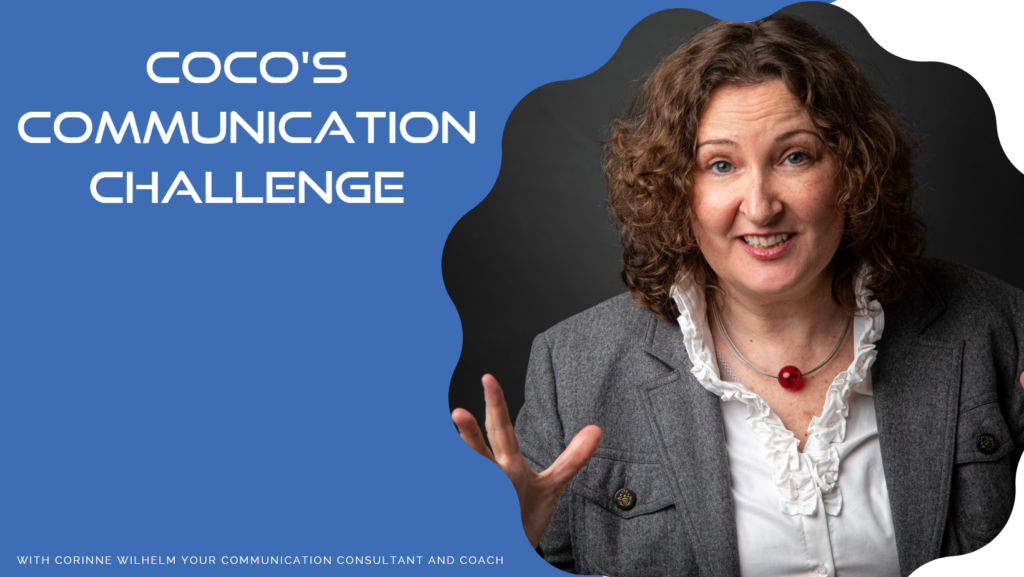Given this podcast’s focus on corporate communication and leadership skills, I felt that now as Mums or Moms returning to work soon are getting their youngest settled into kindergarten or nursery, it would be a good time to discuss the career considerations for returning mothers.
“Navigating the Return to Work: Communication Strategies for Professional Mothers”
In this short 15-20 minute solo episode I will provide practical communication and leadership advice that can help professional women transition smoothly back into the workplace but please be aware that in different cultures the transition back into work might be different – in fact if you have any tips, suggestions or alternatives for young mums to consider then I would love you to join the Linkedin conversation about this. I’ll put a link straight to that post in the show notes in case you are not already following me on LinkedIn.
It’s an easy way to connect with other like minded professional women and men that make it their business to advocate for other experts, that have brilliant minds at work , who just happen to be women.
To make the episode relatable and engaging, I’ll be including some personal examples plus some from successful working mothers who I have worked with as a coach or consultant – anonymously of course – the main thing is to discover how they effectively managed this transition.
You can expect some actionable tips which you can implement immediately to boost your confidence and communication skills as you prepare to return to work. Those of you working with young Mums will certainly learn to appreciate some of the challenges that these professionals will be facing and this empathy will help you communicate with and perform better as a team with these considerations in mind.
So let’s look at some of the logistical and emotional challenges that women returning from maternity leave will be facing as they transition from motherhood back into professional work life.
1. Work-life balance: As a stay at home Mum, juggling the housework and the childcare can feel challenging enough so it can feel pretty intimidating working out how to do all of that on top of going to work. Whether you go back part time or full time, that is still a massive chunk of time out of the home. You’re going to face chaos if you don’t start juggling professional responsibilities with family commitments. It’s certainly not impossible, but it certainly feels like it to start with and this is often the most significant challenge you’ll face.
I hate to talk about systems and procedures in connection with your nearest and dearest but those are exactly what will make this work well without stressing you out, so plan this methodically rather than hoping that everything will fall into place. As a side note your children will tend to act up more if they don’t feel that everything is structured and organised – it gives them that confidence that will help them to make this transition in a more calm and smooth way because let’s face it, if the kids are happy, life is a lot easier but that requires rules, structure and discipline – which I hasten to add wasn’t easy for me either as a new Mum.
2. Confidence and skill gaps: What you have to appreciate here is that many mothers leave work feeling confident that they’ll be back and they can have a family and career, no sweat, but the longer you spend away from the office, your colleagues and the tech for instance, the more your self confidence will start to erode and fade away. It’s easy to feel that you are out of touch and don’t have what it takes do your job as well as you did before but that is mind monkeys having a party, they’re keeping you small and you have my permission to ignore them completely and instead – remind yourself about your talents and competence.
Think about the times, you have been asked to support people, answer questions, onboard people – these are all clear indicators of other people’s confidence in your abilities. Coco’s Communication Challenge for this episode, which normally comes a lot later in the show, is to write down 50 things that you are good at professionally. Think about what other people would say about that – in fact if you can’t think of 50 things, which most people won’t be able to do then call a few friends from work and ask them to tell you. You’ll be amazed at what they come up with. I want you to get 50 things down on paper. Keep that list handy (in your phone perhaps) and refer to it when the monkeys start talking bullshit.
If you feel like your skills will be outdated, do a course, Udemy, Coursera and LinkedIn all have great online courses but remember, you still have a right to training when you get back. Don’t you dare make excuses about not being able to do those because of family commitments, make sure you have a tried and tested support system in place before you go back to work. Make sure you test that system thoroughly now, BEFORE you need it, because that will give you the confidence to focus on your own career needs when you are back at work.
Because training isn’t a luxury, training is a vital part of your career. It’s the thing that will move the needle in terms of your performance and promotion opportunities and maybe a new job at some point.
Because as you know, the only way to get a really decent pay rise is to change employers. So even though now, your children are small, you might not be thinking along these lines, you need to be nurturing your career, so that when you are ready to make that move, you have the confidence, skills and experience and of course in a job interview situation you’ll need to be as qualified as other candidates or able to demonstrate your knowledge with credentials, whether that is certificates or something more academic like a PhD. That’s something by the way – a PhD – which actually more and more women are doing during their maternity leave, so that’s also an option if you’re not ready to go back to work just yet. And gives you a golden opportunity to try out your support system.
3. Childcare arrangements: Finding reliable and suitable childcare is a major concern for working mothers, particularly if your child is neurodiverse but it is a priority. If your partner works long hours and cannot be relied up on, don’t rely on him, find an alternative. Find another Mum that needs babysitting from time to time or a babysitter who loves your kids to bits – pocketmoney for her, freedom for you, fun for the kids – triple whammy. Being a highly mobile family, my parents weren’t even in the same country for most of the time or over 800 km away – clearly not an option. So you have to think outside the box.
I found an awesome ‘Tagesmutter’ That’s a Mum or Grandma who takes in up to 6 children into her own home. I deliberately chose someone who spoke excellent German, had pets, which we don’t, loved doing crafts with the little ones (which I really hate) , musical and relaxed. I’m not always that relaxed and I’m certainly not musical.
Gretha was everything that I am not and my son Finn absolutely loved going to spend time with her and her daughter – oh and the fish which I am sure those food got a lot of food. I also had a fabulous babysitter called Madeline who Finn idolized, particularly after she showed him around the fire station where she volunteered at. I am still in touch with her now. So you see, if you really prioritise your career, you must prioritize establishing a rock solid support system to cover all eventualities including helicopter rides to the hospital, food poisoning and in my case cancer treatment. Nobody wants curve balls, I know, but they happen and they’re a lot easier to deal with if you have people waiting in the wings with your best interests at heart and a soft spot for your kids.
Being self employed when I started a family, I decided to complete my certification as an online trainer during my pregnancy and yes, I was in 2003 one of the first in Germany. As soon as I discovered that I was expecting our son, I convinced one of my key clients Astra Zeneca in Wedel, near Hamburg to roll out what at the time was an innovative new learning initiative – an e-learning programme. So we rolled out ICE (International Communication in English) on a drip feed so that their e-learning programme was built gradually in a way that all staff whether working full or part time could take advantage of language and cross cultural training at a time and pace to suit them. It doesn’t sound like rocket science now but at the time and actually this little and often release prevented the overwhelm that is notoriously one of online learning biggest motivation killers. But I digress, what I’m saying is that you need to plan ahead.
4. Flexibility issues: If Siemens Energy can accommodate single working Mums in the rota of their production lines with up to 17 different shifts, then office workers certainly can be offered more flexibility. Being able to adapt work schedules and making it easy and shameless to time off for appointments or childcare needs is a culture shift that conventional companies still struggle with but these are common problems that make working for your organisation difficult or if they hate their job or boss, impossible. If you want to have one rule for everybody just to keep everybody happy, you are failing because parents with children need a different level of freedom than before. Having said that, all staff deserve a certain degree of flexibility as long as communication is in place.
If you are to maintain the loyalty and respect of your team members, you need to take flexibility seriously. If you are serious about having more women in leadership, then that starts with providing young parents with the freedom to accommodate the needs of their family. In an era of life/work balance, the focus for you as a leader should be on productivity during the time that staff working – you notice I said working, not at work.
By being flexible, you can be rest assured that your team are present and focused when they are working but if people are having to dance around rigid work hours and the requirement to be at the office just because the boss has outdated ideas of working culture, then it will be almost impossible to keep great talent and establish that pipeline of female leaders for the board.
Did you know that after a baby, 28% of new parents leave full-time STEM work. That’s right – After science, technology, engineering, and mathematics (STEM) professionals become parents, 43% of women and 23% of men switch fields, transition to part-time work, or leave the workforce entirely. It’s not surprising then is it really, that there is a gender gap in the leadership pipeline. That’s why flexibility and diversity go hand in hand. Link to Research below
5. Career advancement concerns: Spending time at home with the family will have an impact on the progress that you are making in your career, the guys at the same stage in their career as you, have now moved on with five years worth of experience but it’s not game over! As long as you come back as a reliable and valued member of the team – but you have to keep on top of both formal and informal professional development and be prepared to go for opportunities that you would have loved before becoming a parent.
You might feel less ambitious, that’s the hormones and a shift in priorities to some extent but five years from now, once the children are at school, the regrets tend to kick in and then not just 3-5 years have passed (in Germany) but 10, that makes it hard to bounce back after 10 years. Now is the time to keep on top of your career. Your partner wouldn’t hesitate to do a training course would they? You need to do the same. Make sure that your partner is supportive of you as both a mother and a professional.
6. Mental health and emotional challenges: Many mothers have phases of feeling overwhelmed, nervous or they might have these mood swings when they’re returning to work. And these mood swings show up in all kinds of ways. This gets easier once the children are happy and settled and your systems and procedures get ironed out and optimized, but at the beginning there is a lot going on in your head. Keep away from people that make you feel bad about going back to work!
You have worked hard to establish a career and reputation and you are not neglecting your children at all, you are setting a great example and showing up as a role model and anyway you have everything organised, right. The main thing is to make sure that when you are at home, you are present for your partner and your family – easier said than done, especially if you work from home but for sustainable mental health this is a must.
Set up some ‘Feierabend’ or end of the day rituals so that you can be really focused on your families’ needs – but also your own needs. Meet friends, do sport, relax, get into the nature, go on a date night – make sure that your own needs are not neglected – kids will still need you when they are 16. 18. 21, 30 – it never really ends so protect your mental health and invest in your resilience.
7. Breastfeeding and pumping:
Ooh what a taboo topic!
It’s natural Honey!
For those who choose to breastfeed, which I believe is a beautiful bonding experience if you can, then finding time and appropriate spaces for pumping at work can be stressful. Take a nice big scarf for you to drape so that you have some privacy and make sure you can slip out in between meetings to do so. If this becomes stressful, then putting your baby onto formula is not a deal breaker and often this makes it easier for fathers to do their bit and lighten the load. I breastfed for too long and my shoulder has been weak ever since so consider carefully how long you really want to continue with this ritual – you not the baby – do what is right for you and not what society or your family and friends expect of you. This is your call. You make the decision.
8. Workplace bias: Some mothers face judgment or discrimination for prioritizing their careers alongside their family responsibilities. This is often coming from people who have had a completely different experience of working life to you. Maybe they didn’t enjoy working, perhaps they only knew terrible bosses – that’s tragic isn’t it? The probably weren’t in a role that was as inspiring and challenging as yours.
They see work as a job,
you see work as a career.
If you enjoyed your job before, you can enjoy it now.
You studied, worked yourself up, you increased your knowledge, know how and skills to get you to where you were when you left, you are no less, in fact in terms of time management, empathy and persuasion, you’ve just taken a life based crash course. You can certainly balance family and career – the trick is to surround yourself with people that do exactly that – if you genuinely want both, you’ll make it happen. If not then maybe this isn’t the right company or role for you but don’t rule out work just because the role or the company was wrong. Think very carefully about that.
9. Physical recovery: In some regions of the world, women have no option but to return to work very soon after having the child, so it is quite possible that you will still be dealing with postpartum symptoms and recovery while adjusting to work life. If that is the case, you should be careful not to over do it – as that can trigger a relapse. Perhaps you can start with less hours, or work from home more to start with, have a think of the workarounds and what you need to be able to recover and go easy on yourself.
10. Financial stress: The cost of childcare in some regions and potential loss of income during maternity leave can put both parents under financial pressure. A real strain on any relationship. It can be tempting then can’t it, to come back before you have a kindergarten place or other support systems in place because of the cash gap but you might be exposing yourself to more stress than is healthy. It might be wiser to wait a little bit longer so that you come back to work fully focused and calm about your family situation, so that you can take opportunities, invest your time in training and personal development and really be a part of the social gatherings too. The long term benefits of pay rises and promotions will help you close not only the earnings gap but also the pensions gap. Like most things in life a quality investments often pays off time and time again in the future.
So ultimately then you need to surround yourself by women that you aspire to be like. Perhaps there are professional women that don’t care about their kids, but I have never met one, it is natural for us to worry that we are neglecting our children and whereas the dads do their bit for the family by going for promotion and a fat pay rise so that they can support their family as best as we can, we as amazing mothers might favour flexibility over a payrise, but not in isolation.
We deserve to be paid our worth and to show up in negotiations you need to be able to justify that you are worth more, so keep notes of your successes ideally with facts and stats that make these achievements measurable and write down at least 3 SMART goals before you go back and communicate those with your boss and your partner. Be very clear about where you want to go in your career and find out how to get there, put yourself first at work.
Spend time with other leaders, that also have kids and seem to have the life family balance – at least most of the time – under control, what can you learn from them and how can you help each other?
In January Sonja Culjak and I will be starting an intiative with the hashtag #EmpowerHER, why not follow that hashtag and we’ll reveal more juicy details in due course.
In the meantime, remember that you are still amazing, you don’t have to do this on your own and you deserve financial independence and career satisfaction. Get that solid support system in place, make a list of your talents and knowledge and hold your head up high girl because industry, especially male dominated ones needs experts like you to show up as the expert in an increasingly global and diverse world
And next week I’ll be talking to you about
1. How to set expectations with employers about work-life balance
2. Effective communication techniques for delegating tasks and managing workload
3. Strategies for rebuilding professional networks after extended leave
4. Tips for confidently discussing career goals and advancement opportunities
5. Addressing potential biases and advocating for yourself in the workplace
– Be the role model that your children and grandchildren can look up to and if you want a sparing partner just book in for a Virtual Tea Break and we’ll make sure that your transition back to work is as inspiring as you are.
So take care now, it’s Corinne Wilhelm from Experts Speak English, brought to you by English Speaking Experts.
I’ll see you in LinkedIn – Let’s hear your tips and tricks.



